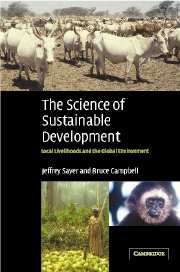Book contents
- Frontmatter
- Contents
- List of figures
- List of boxes
- List of tables
- Foreword
- Preface
- Acknowledgements
- Part I Integrating natural resource management
- Part II Realities on the ground
- Part III The research–management continuum
- 9 The spread of innovations
- 10 Measuring the performance of natural resource systems
- 11 Achieving research-based management
- Bibliography
- Index
9 - The spread of innovations
Published online by Cambridge University Press: 18 May 2010
- Frontmatter
- Contents
- List of figures
- List of boxes
- List of tables
- Foreword
- Preface
- Acknowledgements
- Part I Integrating natural resource management
- Part II Realities on the ground
- Part III The research–management continuum
- 9 The spread of innovations
- 10 Measuring the performance of natural resource systems
- 11 Achieving research-based management
- Bibliography
- Index
Summary
Research on integrated natural resource management should aim to help large numbers of people explore the full range of options that are available for dealing with their local resource management problems. This means creating an environment where science and knowledge help people to develop a diversity of locally appropriate resource management solutions. Integrated natural resource management research should emphatically not be about the discovery of single technological solutions, produced on research stations and made available for widespread application. Consequently, the problems of getting uptake of the results of integrated natural resource management research are quite different to those associated with promoting the adoption of a new technology produced in the research laboratory. Widespread adoption of integrated management techniques may involve changing entire farming, forestry and fishery systems. There are rarely any silver bullets; what is required is often the synchronised change of policies, institutions and technologies: the entire production system has to evolve.
In the past, scientists often blamed farmers for not adopting the latest technological innovations. Farmers were said to be excessively conservative or even insufficiently educated. Some scientists tacitly assumed that the poor in developing countries were simply not smart enough. Most people now accept that in many cases the farmers were very wise not to accept the unproven technologies that were on offer. The life of a poor farmer is fraught with risk and many of the products of research laboratories are ill-adapted to the vagaries of weather and pests that farmers have to deal with in their daily lives.
- Type
- Chapter
- Information
- The Science of Sustainable DevelopmentLocal Livelihoods and the Global Environment, pp. 191 - 210Publisher: Cambridge University PressPrint publication year: 2003



